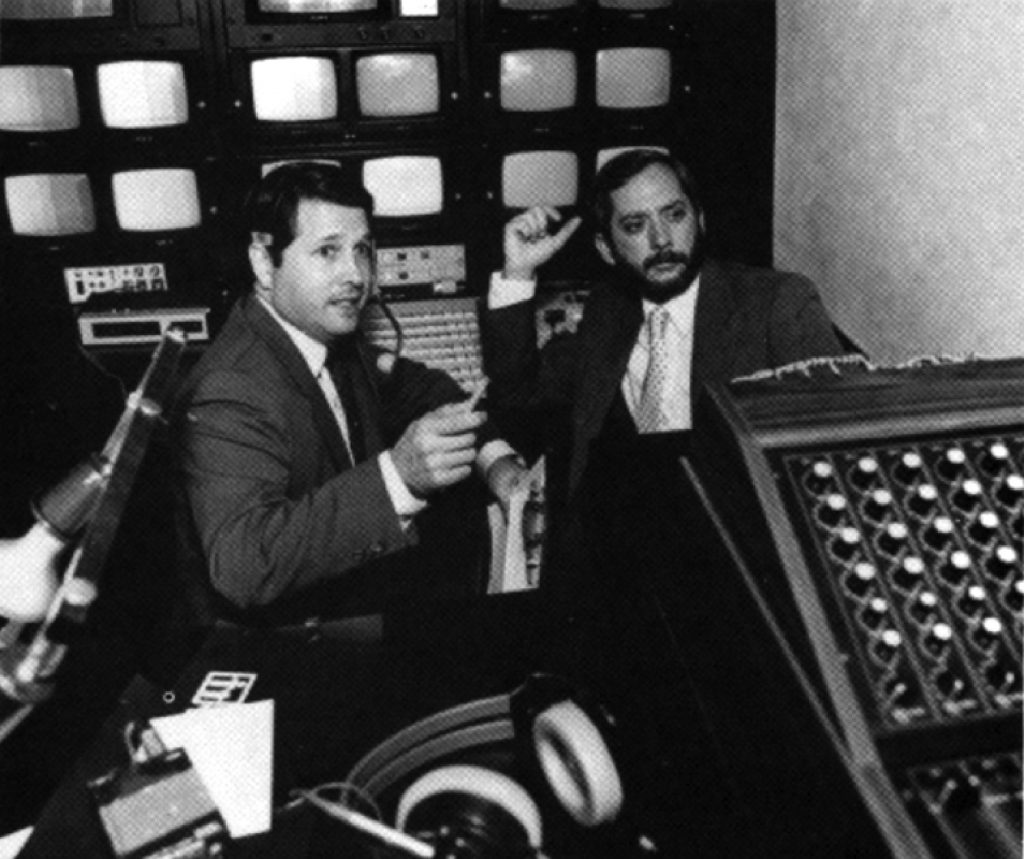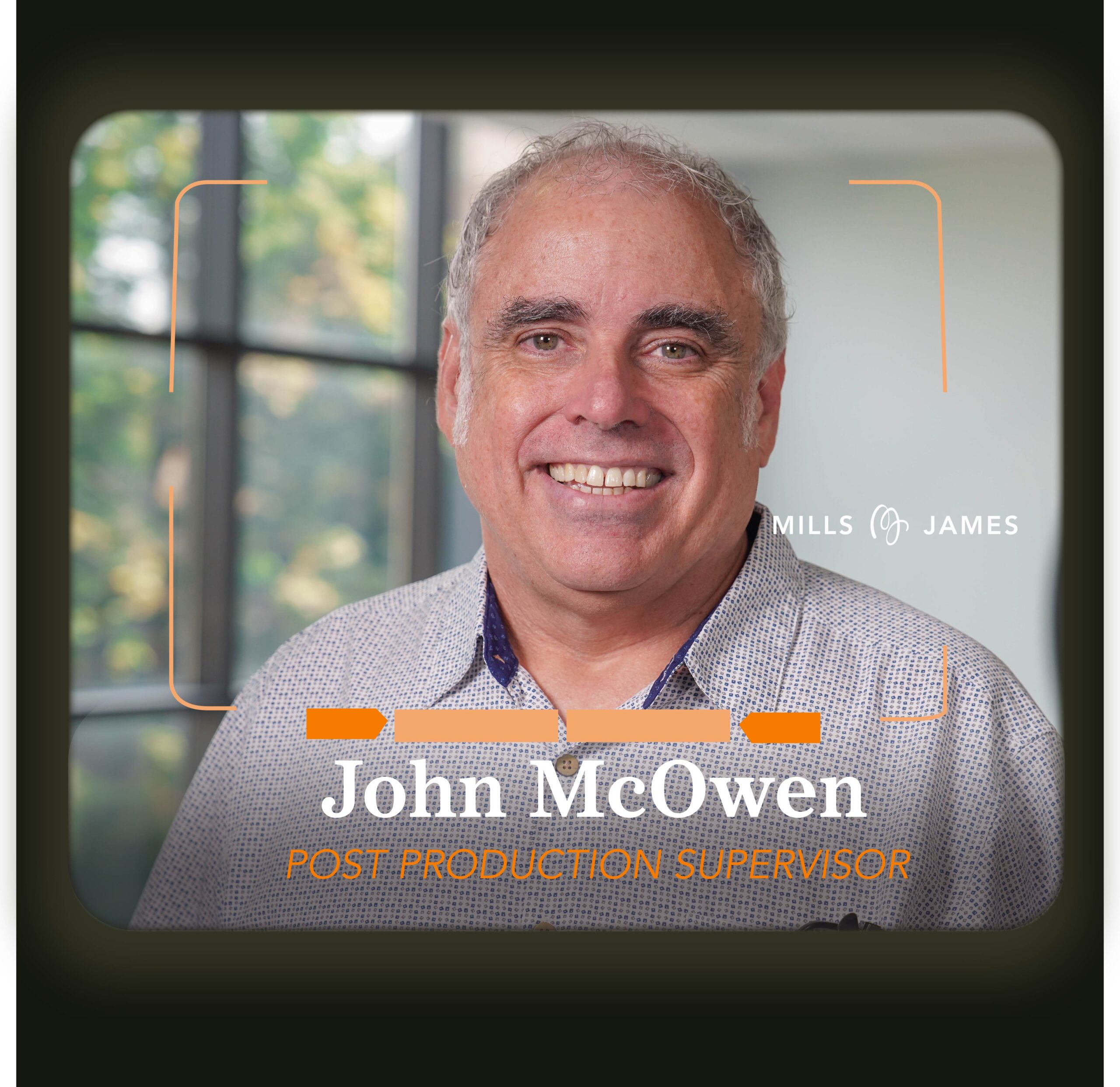
The 1980s | Founded May 1, 1984
The Columbus production world in the 80s was just like today, kinda. Long days and late nights for sure, but the technical issues were analog, and the carryout came from Frisch’s Big Boy or GD Ritzy’s unless you were flush enough for a business dinner at the Jai Lai, a Woody Hayes favorite.
Ad agencies, unions, and flourishing Columbus corporations like The Limited spent half their weeks in production companies cranking out videos like this. One of those production companies was The Media Group, where Ken Mills and Cameron James were employed — Cameron as Sales Director and Ken as Vice President and Producer.
Cameron had already grown The Media Group business six-fold in four short years. His success may have been due to his unconventional leadership role at the American Advertising Federation (AAF). Among other things, Cam would wear a gorilla suit around town and pass out bananas to convince agencies to “Go Ape Over Advertising!” and join AAF Columbus.

Cameron James (left) and Ken Mills
Cameron remembers the first time he saw Ken. The Media Group had steady work in Detroit, but the owners usually only trusted themselves to travel up there for the job. Cameron saw the “new guy” Ken heading out the door for Detroit and thought, “He must be pretty good.”
Opposites in almost every way — Ken more introverted and Cameron comfortable in a gorilla suit — they hit it off immediately. They worked together through challenging projects with impossible deadlines, soon aspiring to run their own business. After a lot of back and forth (mostly Cameron talking Ken into things, a 36-year trend), they decided to go for it.
On May 1, 1984, they opened their doors, with the full knowledge that there’s a fine line between being self-employed and unemployed. They called the company Mills James only because “James Mills” sounded like a person’s name.
The company began in The Canterbury — a mixed-use apartment/office building across from Riverside Hospital — with just a few thousand dollars and no existing clients. What they had in abundance was a love for the production industry and excellent reputations. They also had a doorman at their apartment complex, so it was almost like they had an employee.
And on their first day, the phone rang.
A client from their previous employer had tracked them down. Their first job in business, and it was… rough. They were asked to provide services for an employee recognition event. Easy enough, but they needed some help, so they hired outside vendors.
The final project came back, and the audio was awful. Cameron’s charm kept the client. In this, they learned their first lesson: It takes a lot more than passion and reputation to grow a business — especially when most of their jobs require freelancers and sub-contractors. You need to know who you’re hiring as a form of quality control.
In reflecting on the early days, Ken also reminisced about the many ways they’d manage cash flow. They would make long-distance calls after hours, buy tape that already came with a dispenser, and (our personal favorite) wait for the elderly residents of The Canterbury to head to bed so Ken and Cam could convert the community space into a production studio.
One of their elderly neighbors often mistook Mills James for a coffee shop. She’d come knocking every morning requesting a coffee, and again in the afternoon. And every time, they’d give her one.
Over the next three years, the company started to grow more swiftly, adding post-production and graphics. They soon found themselves running a million-dollar operation.
With accelerating growth, however, always comes increased risk:
- How can you preserve the often-intangible qualities clients love about you in your smaller state as you grow?
- How can you grow your company’s expertise and potential, and not just your payroll?
It was all about who they hired and the culture they wanted to perpetuate, one person at a time. In essence, Ken and Cam wanted the kind of people who would patiently serve a visiting elderly woman coffee.
They also wanted teams of opposites with strengths that counterbalanced their weaknesses. After all, that’s what made Ken and Cameron such a powerful combination in the first place.
They interviewed a lot, always asking their interviewees to share three successes and three failures. While not HR rocket science, the second part helped them assess people’s authenticity, humility, and wisdom.
But there was often one final question Cameron would ask, “Are you a good speller?”


